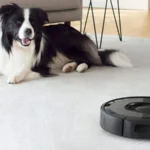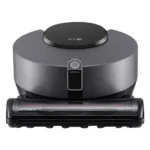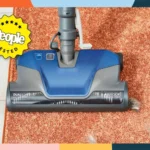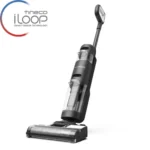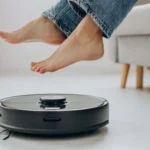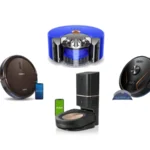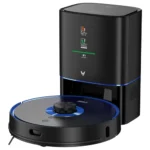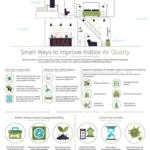Introduction
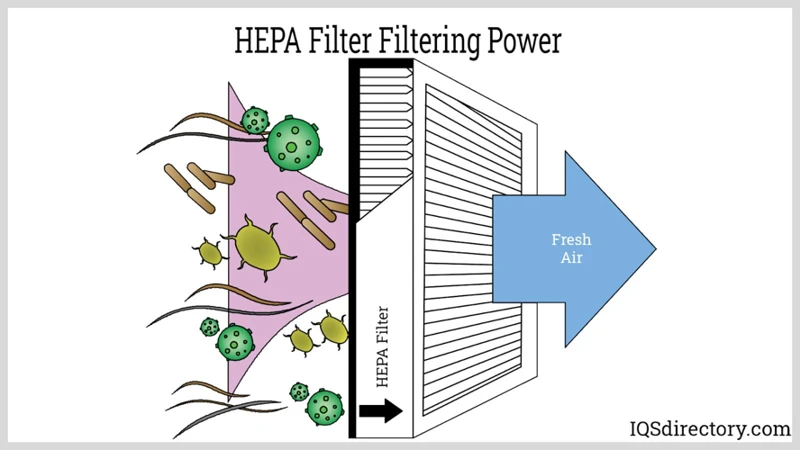
As we navigate through our daily lives, we come across various forms of pollutants and allergens that can have detrimental effects on our health. In an effort to combat these harmful particles, industries have developed advanced air filtration systems, one of which is the HEPA filter. HEPA filters, standing for High Efficiency Particulate Air filters, are capable of capturing a wide range of airborne particles, including bacteria and viruses, and are widely used in various industries, including healthcare, manufacturing, and aerospace. But how do these filters work, and what makes them so efficient? Let’s dive into the intricacies of HEPA filters and unravel their fascinating operating mechanism.
What are HEPA Filters?
HEPA filters, or High-Efficiency Particulate Air filters, are specialized filters that can capture tiny particles that regular filters cannot. The US Department of Energy has set a standard that requires a HEPA filter to capture at least 99.97% of particles that are 0.3 microns or larger. These filters are usually made of small glass fibers that are arranged in a way that creates a maze for air to traverse.
HEPA filters are commonly used in air purifiers and vacuum cleaners as they can trap particles such as dust, pollen, pet dander, and smoke. This makes them ideal for people who suffer from allergies or asthma. HEPA filters can also capture some viruses and bacteria, although they are not specifically designed for that purpose.
HEPA filters are not all alike, however, and their effectiveness can vary depending on the type of material they are made from, their construction, and the size of the particles they are designed to capture. HEPA filters are graded according to their Minimum Efficiency Reporting Value (MERV) rating, which ranges from 1 to 20. The higher the MERV rating, the more efficient the filter is at capturing particles.
It is important to note that HEPA filters do not remove certain gaseous pollutants, such as tobacco smoke, and they do not remove odors from the air. To eliminate these types of pollutants, additional filtration is required, such as activated carbon or ionizer filters.
HEPA filters are essential components of air purifiers and vacuum cleaners, providing superior air quality for people who suffer from allergies or asthma. To learn more about smart vacuum cleaners and their filtration systems, check out our article on the benefits of smart vacuum filtration systems.
Operating Mechanism of HEPA Filters
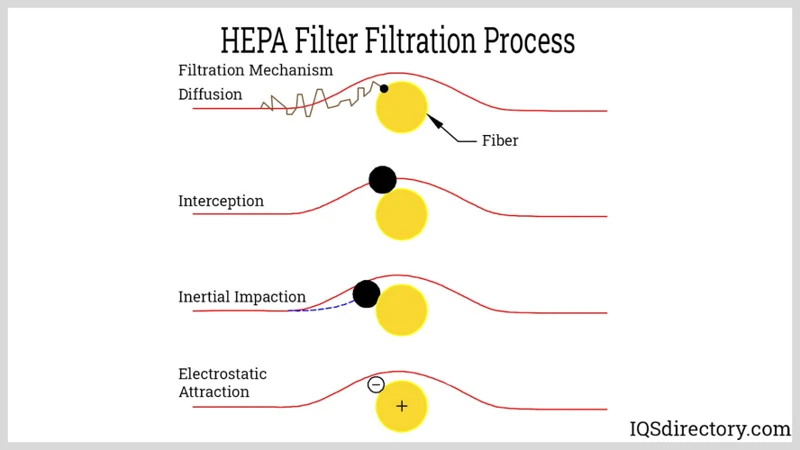
HEPA filters are an essential component of many air filtration systems, used to clean the air of pollutants and particles. These filters can remove up to 99.97% of particles as small as 0.3 microns, making them highly efficient at trapping harmful substances. The Operating Mechanism of HEPA Filters works on the principle of mechanical filtration, which relies on the size, shape, and composition of particles to separate them from the air. Unlike electrostatic air filters, which use static electricity to attract particles, HEPA filters physically capture them with a dense layer of fine mesh. This method of filtration makes them an ideal choice for those who suffer from allergies or asthma, as they can effectively remove common triggers such as dust, pollen, and pet dander from the air. To learn more about how these filters work and the different types available, continue reading below. If you’re interested in the noise level of smart vacuum cleaners, check out this article.
How do the Filters Work?
HEPA filters use a complex mechanism to remove even the tiniest particles from the air. The filter is made up of randomly arranged fibers that trap particles as air flows through the filter. The particles adhere to the fibers via several different mechanisms including interception, impaction, and diffusion.
- Interception: This occurs when particles simply come into contact with a fiber as they pass through the filter. The fibers are positioned in such a way that particles would have to travel in a straight line to avoid contact.
- Impaction: This happens when particles are too big to follow the air stream and collide with a fiber. As particles collide with the fibers, they are trapped and removed from the air.
- Diffusion: This mechanism removes the smallest particles that might otherwise slip through the filter. When these small particles collide with gas molecules, they become displaced and move erratically. As a result, they are more likely to come into contact with a filter fiber and become trapped.
HEPA filters are particularly useful for people with allergies or respiratory problems because they can remove allergens, dust, and other harmful particles from the air. Additionally, they are used in a variety of industries where air quality is important, such as hospitals, laboratories, and computer chip manufacturers.
One thing to keep in mind when using HEPA filters is that they can become clogged over time with the particles they trap. This can cause reduced airflow and reduced efficiency, so it is important to clean or replace the filter regularly.
It’s also important to note that not all air filters are created equal. True HEPA filters are the most efficient type, removing up to 99.97% of particles that are 0.3 microns in size or larger. HEPA-type filters, on the other hand, are less efficient and may only remove particles down to 2 or 3 microns in size.
Understanding how HEPA filters work can help you choose the best filter for your needs. With regular maintenance and proper use, these filters can provide clean air and some peace of mind.
Efficiency Levels
The efficiency of a HEPA filter is measured by its ability to trap particles of different sizes. The most commonly known size of particle that a HEPA filter can capture is 0.3 microns, but it is important to note that HEPA filters can capture particles of all sizes.
HEPA filters are classified into three efficiency levels: HEPA-U17, HEPA-U16, and HEPA-U15. These levels represent the percentage of particles that are captured by the filter.
- HEPA-U17: captures 99.99997% of particles with a size of 0.12 microns or larger. These filters are used in the most critical environments such as nuclear facilities, pharmaceutical labs, and hospitals.
- HEPA-U16: captures 99.9999% of particles with a size of 0.15 microns or larger. They are used in cleanrooms, semiconductor manufacturing, and research facilities.
- HEPA-U15: captures 99.997% of particles with a size of 0.2 microns or larger. These filters are used in environments where extreme cleanliness is important, such as aerospace, optics, and microelectronics industries.
HEPA filters provide efficient air filtration, but it is essential to consider the filter’s efficiency level when choosing a filter for a particular application. If a filter’s efficiency is lower than what is required for the intended environment, it may not provide adequate protection.
When using a vacuum with a HEPA filter, it is essential to ensure that the filter is replaced regularly, as a clogged or dirty filter will negatively impact filter efficiency. To reduce noise levels, you might want to consider purchasing a smart vacuum with a high-quality HEPA filter. You can learn more about the benefits of using a smart vacuum filtration system by clicking on the following link: /smart-vacuum-filtration-benefits/.
Filter Maintenance
Proper maintenance of HEPA filters is a crucial aspect to ensure that they continue to function efficiently. Here are some tips for maintaining your HEPA filters:
- Regular Cleaning: Regular cleaning of the filters is essential to make sure they work at their full capabilities. For vacuum cleaners fitted with HEPA filters, clean the filter housing and filter every 6-12 months or as needed.
- Replacement of Filters: Replacement is an important maintenance activity that should not be neglected. You must replace the filter as and when more than its lifespan so that it continues to function optimally. Replace the filter every 1-2 years with genuine parts or as needed.
- Usage Instructions: Follow the usage instructions as supplied by the manufacturer. Using the filter outside of these instructions could cause harm to the filter.
Regular maintenance of filters in vacuum cleaners and air purifiers is essential to ensure they function effectively. HEPA filters are effective in trapping tiny particles and harmful allergens, which contributes to improving indoor air quality. By following these simple maintenance tasks, you can ensure your filters provide clean air to your home or office for an extended period of time.
To further enhance the performance of your vacuum cleaner, consider investing in a smart vacuum cleaner that has reduced noise levels. For more information on how to reduce noise levels in a smart vacuum cleaner, check out our article on “Reduce noise level in smart vacuum”. Comparison of noise levels between various options for smart vacuum cleaners can be found in this article on “Smart Vacuum Cleaner Noise Level Comparison”.
Types of HEPA Filters
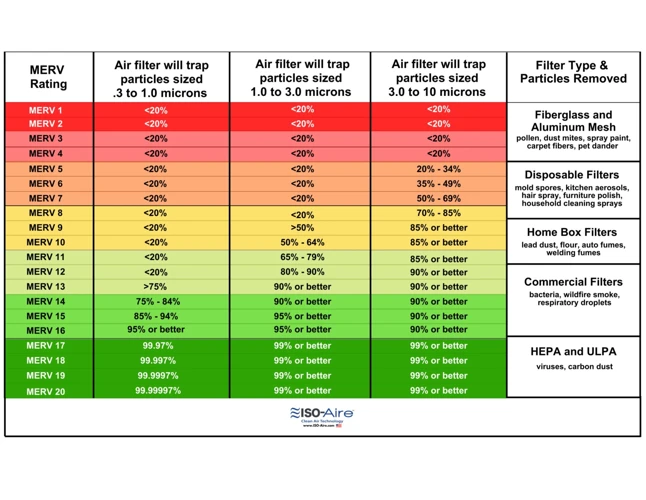
When it comes to HEPA filters, there are actually different types available on the market. Understanding the different types of HEPA filters can help you choose the right one for your needs. From True HEPA filters to HEPA-Type filters, each has its own unique features and advantages. In this section, we’ll take an in-depth look at the different types of HEPA filters and what makes each one stand out. So, let’s dive in!
True HEPA Filters
When it comes to HEPA filters, there are two main types: True HEPA filters and HEPA-Type filters. True HEPA filters are the more effective of the two, and are able to capture particles that are as small as 0.3 microns in size with an efficiency rate of 99.97%. This means that for every 10,000 particles that pass through the filter, only 3 are able to get through.
So, what sets True HEPA filters apart from other filters?
First and foremost, it’s important to understand that not all filters that claim to be HEPA filters are actually True HEPA filters. True HEPA filters must meet specific standards and be certified by the United States government. This certification ensures that the filters are able to capture particles that are as small as 0.3 microns with an efficiency rate of 99.97%.
But how do True HEPA filters work?
True HEPA filters use a combination of several mechanisms to trap and retain particles. These mechanisms include interception, impaction, and diffusion. As air passes through the filter, larger particles are trapped through impaction (when a particle collides with a fiber and gets stuck) or interception (when a particle follows the airflow stream and gets caught in a fiber). Smaller particles are removed through diffusion, which causes them to move erratically and collide with other particles, eventually being trapped in the fibers.
One of the benefits of True HEPA filters is that they are able to remove a wide variety of particles from the air. This includes pet dander, pollen, dust mites, and even some bacteria and viruses. This makes them an excellent choice for individuals with allergies, asthma, or other respiratory issues.
However, it’s important to note that True HEPA filters do have some limitations. While they are effective at capturing particles from the air, they are not able to remove odors, chemicals, or volatile organic compounds (VOCs) from the air. They require regular maintenance in order to continue functioning properly.
To summarize:
True HEPA filters are certified by the U.S. government to capture particles that are as small as 0.3 microns with an efficiency rate of 99.97%. They use a combination of interception, impaction, and diffusion to trap and retain particles. They are effective at removing a variety of particles from the air, but are not able to remove odors, chemicals, or VOCs. Regular maintenance is required in order for them to continue functioning properly.
| Pros | Cons |
| High efficiency rate (99.97%) | Cannot remove odors, chemicals, or VOCs |
| Effective at removing a variety of particles from the air | Requires regular maintenance |
| Excellent choice for individuals with allergies or respiratory issues |
HEPA-Type Filters
HEPA-type filters are often confused with true HEPA filters. While similar in name, HEPA-type filters are not the same as true HEPA filters. These filters are generally less expensive and are not held to the same strict standards as true HEPA filters.
Characteristics of HEPA-Type Filters:
- HEPA-type filters are less efficient than true HEPA filters. They can capture particles as small as 2 microns, but not as small as 0.3 microns.
- These filters are usually made from a less dense material than true HEPA filters. This allows more air to flow through the filter, as well as making it more affordable than a true HEPA filter.
- HEPA-type filters can be made from a variety of materials, including foam, fiberglass or cotton.
- They can remove pollen, pet dander, mold spores, and some bacteria from the air, but they cannot capture viruses or cigarette smoke particles.
- HEPA-type filters are generally used in residential settings, such as in air purifiers, while true HEPA filters are used in more commercial settings, such as hospitals and laboratories.
It is important to note that while HEPA-type filters may be a more affordable option, they are not as effective as true HEPA filters. They also need to be replaced more frequently than true HEPA filters, as they tend to fill up with debris faster due to their less dense material. Additionally, they are not recommended for those with severe allergies or asthma.
If you are considering an air purifier with a HEPA-type filter, it is important to understand the limitations of this type of filter. It may be a more affordable option, but it may not provide the level of air purification that you need. It is always a good idea to do your research and understand the differences between HEPA-type filters and true HEPA filters before making a purchase.
Advantages and Disadvantages of HEPA Filters
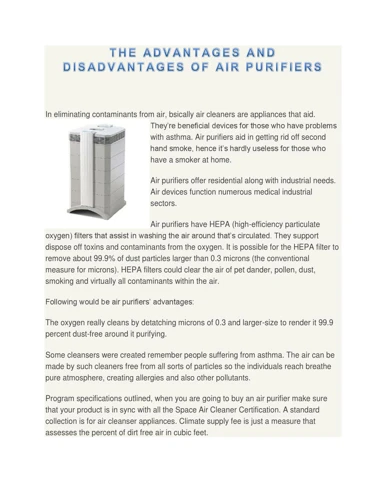
It’s important to consider both the advantages and disadvantages of using HEPA filters in order to make an informed decision about whether they are right for your needs. On the one hand, HEPA filters offer a range of benefits that make them a popular choice for air filtration, including their ability to capture tiny particles and purify the air in your home. However, there are also some potential drawbacks to consider, such as their high cost and the need for regular filter replacement. In this section, we will explore the pros and cons of using HEPA filters in more detail.
Advantages
HEPA filters offer numerous advantages, making them a perfect choice for various applications. Some of the significant benefits of HEPA filters include:
- High Efficiencies: HEPA filters can filter out more than 99.97% of particles that are 0.3 microns or more significant in diameter. This makes them an ideal choice for industries that require very high levels of cleanliness, such as medicine, electronics, and nuclear energy.
- Better Air Quality: HEPA filters can effectively remove pollen, dust, and pet dander, which are the primary causes of allergies and respiratory issues such as asthma. This makes them a preferred choice for hospitals, clinics, and residences of people with respiratory problems.
- Durable and Long-lasting: HEPA filters are made with high-quality materials, which makes them durable and long-lasting. They can function for 3-5 years without needing to be replaced, proving to be a cost-effective solution for air filtration needs.
- Environmentally Friendly: HEPA filters are environmentally friendly and do not emit any harmful substances. This makes them a preferred choice for those who are conscious about their carbon footprint and want to contribute to a greener planet.
- Versatile: HEPA filters can be installed in various types of air filtration systems, such as HVAC systems and air purifiers, making them a versatile solution for air quality requirements.
- Easy to Maintain: One of the significant advantages of HEPA filters is that they are easy to maintain. All that is required is periodic vacuuming or washing to remove accumulated dirt and debris, which makes them a convenient choice for end-users.
HEPA filters offer numerous advantages, making them a perfect choice for a wide range of industries and applications. From providing better air quality to being environmentally friendly and cost-effective, HEPA filters stand out as a versatile and reliable air filtration solution.
Disadvantages
While HEPA filters are known for their high levels of filtration efficiency, they also come with a few disadvantages that should be considered before making a purchase.
Disadvantages of HEPA Filters
| Disadvantage | Description |
|---|---|
| High Initial Cost | HEPA filters can be more expensive than other types of filters, which can make them less accessible to those on a budget. |
| Regular Maintenance | HEPA filters require regular replacement or cleaning, which can add to the overall cost of using the filters over time. |
| Reduced Airflow | Due to their high filtration efficiency, HEPA filters can also reduce the overall airflow in a room or in a ventilation system. |
| May Not Filter Smaller Particles | While HEPA filters are designed to filter particles as small as 0.3 microns, they may not be effective against smaller particles such as viruses and bacteria. |
| May Need to be Certified | In some cases, HEPA filters may need to be certified in order to ensure their effectiveness, which can add to the overall cost. |
It’s important to carefully consider these potential disadvantages before purchasing a HEPA filter. While their high levels of filtration efficiency make them a popular choice, the cost and maintenance requirements may not be ideal for everyone. It’s also important to note that HEPA filters may not be effective against all types of pollutants, so additional air purifying measures may be necessary.
Applications of HEPA Filters
HEPA filters are incredibly versatile tools that can be used in a wide range of applications, from healthcare to construction. These filters are designed to capture and remove even the smallest particles from the air, making them ideal for use in environments where cleanliness and air quality are of the utmost importance.
Hospitals and Healthcare Facilities: One of the most common applications of HEPA filters is in hospitals and other healthcare facilities. These filters are installed in ventilation systems to remove contaminants and airborne pathogens from the air, thus helping to prevent the spread of disease and infection.
Laboratories: Laboratories that deal with hazardous chemicals or other dangerous substances often use HEPA filters to ensure that the air within the lab is free from potentially harmful particles. These filters help to protect both workers and the surrounding environment by keeping the air as clean as possible.
Pharmaceutical Manufacturing: In the pharmaceutical industry, HEPA filters are commonly used in manufacturing facilities to prevent contamination of products. These filters help to maintain a clean environment, minimizing the risk of impurities or other contaminants in the final product.
Food Processing and Packaging: Food processing and packaging facilities also often use HEPA filters to maintain a clean environment, particularly in areas where food is prepared or packaged. These filters can help to prevent airborne bacteria or other contaminants from entering the food supply, thus ensuring product safety and quality.
Cleanrooms: HEPA filters are a crucial component of cleanroom environments, which are used in a variety of industries, including pharmaceuticals, electronics manufacturing, and biotechnology. These environments must be kept exceptionally clean to ensure that products are not contaminated during manufacturing.
The applications of HEPA filters are many and varied, with uses ranging from healthcare to industrial settings. These filters play a critical role in maintaining clean and safe environments, and their effectiveness has made them an essential tool across many different fields.
Conclusion
After diving into the world of HEPA filters and discovering their remarkable efficiency in capturing even the smallest of particles, it’s clear that they serve as an essential tool in creating a cleaner and safer environment. HEPA filters work by trapping airborne contaminants through a series of fine fibrous materials, essentially acting as a barrier that separates harmful particles from the air we breathe.
While there are different types of HEPA filters available, all work under the same fundamental mechanism, which proves to be highly effective. However, it’s important to note that proper maintenance of these filters is crucial to ensuring their continued efficiency. Regular cleaning and replacing of the filter when necessary is necessary to maintain their high performance.
Despite HEPA filters being some of the most efficient air filters available, they do come with a few disadvantages. The most notable being their relatively high cost compared to other types of air filters. Additionally, certain types of HEPA filters can be bulkier and more cumbersome to handle, which may not be feasible in certain cases.
Overall, HEPA filters have a wide range of applications, from air purifiers to surgical rooms in medical facilities. The advantages of using HEPA filters, such as their high efficiency levels in capturing tiny particles, far outweigh their disadvantages. Whether in homes, offices, or hospitals, using HEPA filters is a step towards creating a cleaner and healthier environment for everyone.
Frequently Asked Questions
What does HEPA stand for?
HEPA stands for High-Efficiency Particulate Air.
What is a HEPA filter made of?
HEPA filters are often made of a combination of borosilicate fibers and plastic resins.
Can HEPA filters remove viruses such as COVID-19?
Yes, HEPA filters can remove viruses such as COVID-19, as they are able to capture particles as small as 0.3 microns.
How often should I change my HEPA filter?
HEPA filters should be replaced every 6-12 months, or when the filter becomes clogged with particles.
Can HEPA filters remove cigarette smoke?
Yes, HEPA filters are effective at removing cigarette smoke from the air.
What is the difference between a True HEPA filter and a HEPA-Type filter?
A True HEPA filter must meet strict standards set by the US Department of Energy, while a HEPA-Type filter is not held to as strict of standards.
Can I clean my HEPA filter instead of replacing it?
Most HEPA filters cannot be cleaned, and attempting to do so can damage the filter. It is recommended to replace the filter instead.
Can HEPA filters be recycled?
Yes, HEPA filters can be recycled, but it is important to check with your local recycling program to see if they accept them.
How much do HEPA filters cost?
HEPA filters can range in price from around $20 to over $100, depending on the brand and type of filter.
What are some common applications of HEPA filters?
HEPA filters are commonly used in air purifiers, vacuum cleaners, and HVAC systems to improve air quality.

